
BBC Sherlock Fan Forum - Serving Sherlockians since February 2012.
- Lilythiell
- High Functioning Sociopath
 Offline
Offline 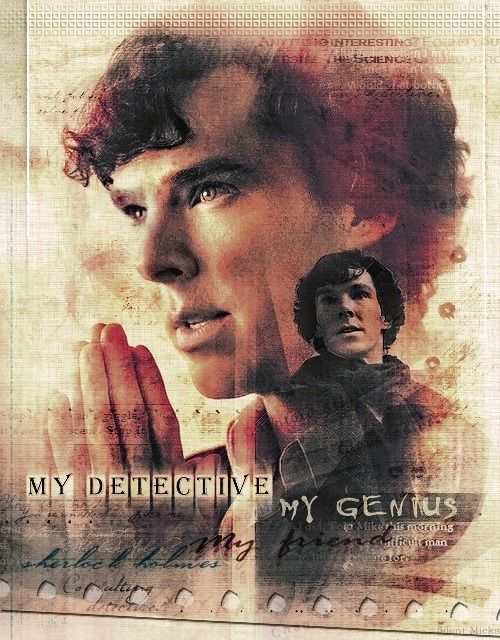
- From: France
- Registered: May 11, 2014
- Posts: 2,371
Re: The Abominable Bride (for those who have seen it)
@besley I think we were meant to work on it. It's not like they know we love to analyse every damn little detail, and something as precise as that certainly seems to be a cue to "get to work".
So, I think we were meant to understand it -just not right away ![]()
-------------------------------------------------------------------------
I'd be lost without my blogger.
"It’s not a ‘gang’ show, it’s the Sherlock and John show. It’s about developing their characters and their relationship, and the characters drawn into their orbit.” Steven Moffat
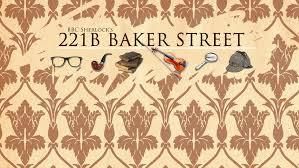
- Lilythiell
- High Functioning Sociopath
 Offline
Offline 
- From: France
- Registered: May 11, 2014
- Posts: 2,371
Re: The Abominable Bride (for those who have seen it)
@SwanPride I concur. Just add that it was an episode laced with humour, a reflection on gender equality/rights and pleeeeenty of psychological analysis.
Oh, this is getting rather fun!
-------------------------------------------------------------------------
I'd be lost without my blogger.
"It’s not a ‘gang’ show, it’s the Sherlock and John show. It’s about developing their characters and their relationship, and the characters drawn into their orbit.” Steven Moffat

- SolarSystem
- Threatened Knighthood
 Offline
Offline - From: Germany
- Registered: July 30, 2013
- Posts: 10,650
Re: The Abominable Bride (for those who have seen it)
Sherlock Holmes wrote:
SolarSystem wrote:
Here goes my theory concerning Mycroft and Mary (and I know it's early in the game for such theories, but it's what came to my mind almost immediately after watching TAB):
As I've said before today, I'm pretty sure Mycroft is going to die in S4. They made so clear now how much he cares for Sherlock, that it would be the most devastating thing for us and for Sherlock to lose Mycroft. And they said S4 will be dark and devastating, right?
Then, someone has to take Mycroft's place. There has to be some sort of Mycroft in the show. And they gave us a Mary in TAB who is clever beyond belief. And who seemingly is accepted by Mycroft. So who would be better for the job...? Both their names start with an 'M'. And as a side note: In "Doctor Who" Moffat gave us a female Master - the Master has been male for decades. But now we have a female Master - why not a female Mycroft in "Sherlock".
I'm not saying that I will like any of this. I probably won't. But it somehow seems logical to me.
But what about the baby?
What about the baby? Well, they'll have to deal with the baby one way or another anyway. I don't see it getting any more complicated with Mary being in a more powerful position - as a matter of fact, I actually think it would make it even easier and more affordable for her (and John) to have someone else look after the baby while the two of them go about their business.
___________________________________________________
"Am I the current King of England?
"I see no shame in having an unhealthy obsession with something." - David Tennant
"We did observe." - David Tennant in "Richard II"
- Punch me in the face
- Mycroft's Contact
 Offline
Offline 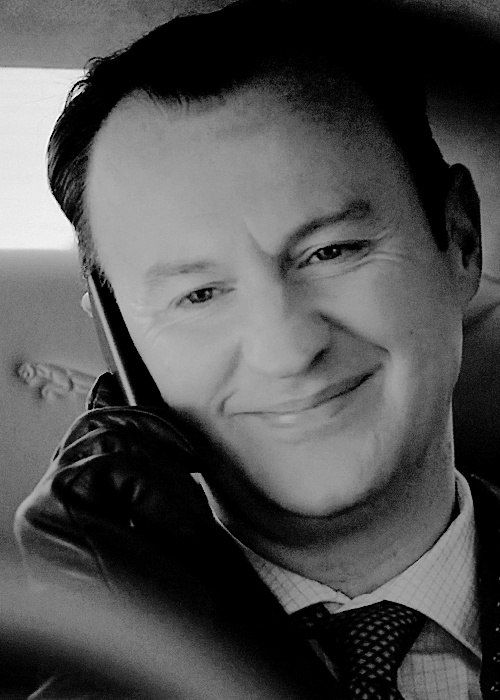
- From: Lille, France
- Registered: May 16, 2013
- Posts: 587
Re: The Abominable Bride (for those who have seen it)
I'm currently reading the whole transcript someone kindly shared on internet and now that I know the victorian scenes take place in Sherlock's MP, i realise Moftiss had given us a lot of clever clues about that and that even if some lines confused me yesterday, I never thought they were clues that all this was happening in Sherlock's mind, and that Sherlock was actually trying to solve Moriarty's case through the old bride's one.
Want examples??
When Victorian John and Mary are arguing at Baker Street and Sherlock says "Enough!", here is what he then says:
S: "The stage is set, the curtain rises. (so all we are watching next is a "play", it's not the reality). We are ready to begin."
J: "Begin what?"
S: "Sometimes, to solve a case, one must solve another." (to solve the mystery of Moriarty's death, Sherlock has to solve the Abominable Bride's one in his mind palace)
J: Oh, you have a case, then? A new one?
S: An old. Very old. (victorian era). I shall have to go deep.
J: Deep? into what?
S: Myself. (deep into his mind palace!!!!)
Or later, at the morgue, Sherlock says about Emelia Ricoletti:
S: How could he survive?
"She, you mean."
S: "i'm sorry?"
"Not 'he', 'she' "
S: "Yes. yes of course."
>> He says "He" because he refers to Moriarty! That was the real Sherlock "speaking", not the MP one!!
Oh, that's clever, so very clever!!! ![]()
Last edited by Punch me in the face (January 2, 2016 3:49 pm)
************************
Just like old times...

- Yitzock
- Stayin' Alive
 Offline
Offline 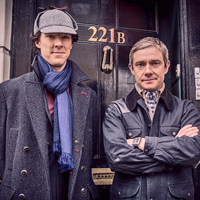
- From: Canada
- Registered: May 5, 2015
- Posts: 3,887
Re: The Abominable Bride (for those who have seen it)
I have not been able to go through every bit of what you guys have already said, though I did read several pages, so I'm sorry if during our discussion I repeat something that you've already talked about and that I missed.
This episode went by unbelievably fast. I couldn't believe when it was already almost 10:00. There were a few times I thought it was going to end, but then it kept going. I'm glad it didn't end when I thought it would, but I kept getting faked out as to where it was going to end. While I was sad when it was over, because it meant it was over, I still like how it went. It gave us something (and an extra fun case) while also not giving away too much for the next episodes. After mulling it over in my mind, I was satisfied with what we were given.
I know we've already talked about the parallels between the Bride and with Moriarty, but there is also the parallel between Sherlock and the extra corpse. Don't know whether there's anything else to be determined from that, but perhaps it's part of the fact that Moriarty and Sherlock are different but still have a lot in common. And if the Bride's operation was taken over after her death, who has taken over for Moriarty?
They sure faked us out about Molly! She was in the episode after all, and I like what they did with her. I recognized her right away, and until the conversation with Watson at the end I was sure that she was just supposed to be a man instead of a woman in disguise.
I found it funny that Pepper's Ghost came up in this episode, considering we had a Secret Santa story this December that also included that. Funny coincidence, that.
Fat Mycroft bothered me with how far they went, but after thinking about this all being in Sherlock's head, it kind of makes sense. He teases Mycroft about his dieting and weight in the rest of the series, this was him having fun with that and taking it further. Interesting that some of you think Mycroft is going to die...I sure hope not. But then again, you guys often think of things that I don't. But that's the fun of bouncing things off each other.
My mum and I couldn't help but get a chuckle out of the swan dive into the waterfall.
I am also wondering about how closely Mary and Mycroft have been working together. They certainly seemed to already have a rapport in the plane scene.
I re-watched the conversation where Watson brings up the photo of Irene Adler. Holmes quotes Watson's description of him, but then Watson talks about that being the image that he has created of Holmes but knows that that's not how he really is. Since this is a scene that occurs in Sherlock's mind, I think it must mean that Sherlock realizes now that John doesn't just see him as a thinking machine under control of his emotions. Either it means he failed in projecting that image onto everybody, or (as I prefer to think) that he knows that John sees him and knows him better than anybody else, can see that Sherlock is not emotionless. Because as much as Sherlock projects the image of being under control of his emotions, not letting them completely control him, he still needs someone to understand him and really know him and has bonded with John in a way that he has shown his emotions to John. He's lonely without John, who knows him better than anyone else. Sherlock knows that John can see through the surface of how Sherlock acts, knows that there's more to him. Sherlock doesn't know how to talk about it, as is made evident by the conversation we see in the special, but he knows that John understands and he needs that.
I may have forgotten some of what I wanted to say, so I'll be back if I remember it, but here's what I have thought about so far.
Last edited by Yitzock (January 2, 2016 3:52 pm)


Clueing for looks.
- nakahara
- Threatened Knighthood
 Offline
Offline 
- Registered: February 22, 2014
- Posts: 11,979
Re: The Abominable Bride (for those who have seen it)
I find it interesting that some of you regard the Special as the feminist story – when it was just the opposite.
Sherlock is not Emmeline Pankhurst, he does not feel with those women, he fears them. In his mind palace scene, he sees them as a bunch of robots, devoid of any personality of their own, marching around like the army of Borgs, avoiding the eye contact, blindly waiting on the orders of their leader, being pliable in her hands “as a corpse is in the hands of the coroner”. To continue their anti-men conspiracy, they could actually meet in a tea-house or a coffee-house reserved exclusively for them as well, but no, they are presented as the people who inhabit wasteland of ruins, far-away from humanity, which only adds to the feeling “these women are unnatural, they are an enemies of society”. The capes (and the five orange pips) that connect them with Ku-Klux-Clan are only the cherry on top of the cake.
And of course, these women are very Ku-Klux-Clanish in their methods too. They freely kill every person they deem as their enemy and in this universe, this is seen as justified. Well, if murdering your opposition in a beastly way is empowering, then the Islamic State, IRA, ETA and similar terrorist organizations must be seen as empowering and justified too, since they use the very same methods in RL either.
Men who hate feminism often point out, that in their opinion the feminist do not fight for the equality of both sexes, but for the female supremacism. And Sherlock´s mind palace is the very example of this fear. Even Molly who is sweet, sympathetic and supportive in RL seems to be a threat here, a ruthless, unscrupulous, immoral individual who employs most brutal methods to dispose of their enemies. Of course, such individual can insult, belittle and maim men to her liking, because men are not her life partners, they are the enemy she fights to the death.
The idea that women can enrich society because they tend to be more emphatic and they tend to avoid unnecessary conflict, so they could make a difference in the men´s competitive, “survival of the fittest” world, does not register here. Women are seen as strong not because they brought their own, feminine qualities to good use, but because they started to kill and maim like men and disposed themselves of their feminine qualities altogether that way. This is the very antithesis of feminism, if you think about it. Feminine is still seen as wrong – to mean something, women must become the hard-fighting ninjas tough as nails, they must become “men” themselves.
No, Sherlock does not see women in a positive way, just the opposite - his outlook on them is fearful and negative to the extreme.
And why is this? Because in RL, one woman whom he trusted belittled and humiliated him, the other ruthlessly shot him and in result killed him when she took John away from him.
“This is the war we must eventually loose.”
Sherlock sacrificed everything to John and yet in the end, Mary has won over him and took John and the meaning of his life away from him. She even overtakes his role as a clever and brilliant detective in his mind palace and ridiculed him there. And since the role of the brilliant detective was what brought John to his side initially, it´s obvious that Mary will now possess John the way she possesses Sherlock´s former qualities as well.
“Mary, please, take me home.”
It´s no coincidence that John in Sherlock´s mind palace has this request, in Sherlock´s eyes, present-time John is entirely under the influence of Mary.
You think Special presents Sherlock´s lovely outlook on Mary? Think twice!
Mary leads Sherlock to the assembly of Fem-Woman-Clan, but she doesn´t seem like she disagrees with them. She is much too cosy around them. And she doesn´t even blink, when Sherlock´s worst fear, Moriarty, appears around them in the guise of the bride… This M she received must not necessarily mean “Mycroft”, IMHO….
-----------------------------------
I cannot live without brainwork. What else is there to live for? Stand at the window there. Was there ever such a dreary, dismal, unprofitable world? See how the yellow fog swirls down the street and drifts across the dun-coloured houses. What could be more hopelessly prosaic and material? What is the use of having powers, Doctor, when one has no field upon which to exert them?

- silverblaze
- Official Blogger
 Offline
Offline - From: Netherlands
- Registered: December 4, 2013
- Posts: 1,353
Re: The Abominable Bride (for those who have seen it)
Yitzock wrote:
I found it funny that Pepper's Ghost came up in this episode, considering we had a Secret Santa story this December that also included that. Funny coincidence, that.
LOL, great minds think alike, that's how I prefer to think of it. ![]()
![]()
- silverblaze
- Official Blogger
 Offline
Offline - From: Netherlands
- Registered: December 4, 2013
- Posts: 1,353
Re: The Abominable Bride (for those who have seen it)
Nakahara, I don't see it like that, the women killed because they were severely mistreated and in their culture, didn't have a way out.
Holmes' journey was to realise that this was indeed a 'war we must lose', whether the women were right or not, though I'm inclined to think that the women were right.
- nakahara
- Threatened Knighthood
 Offline
Offline 
- Registered: February 22, 2014
- Posts: 11,979
Re: The Abominable Bride (for those who have seen it)
Some reflections on John:
We see two Imagined Johns during the story – one is John from the present time, the other is Victorian Watson.
It is interesting that the present time Imagined John proves to be absolutely unreliable and “under Mary´s slipper”. As soon as there is a problem he abandons Sherlock.
Therefore Sherlock must create his “ur-form”, The Victorian Watson, in his mind and it´s this Imagined “ur-John” who shields him from his worst fears in the form of Moriarty.
The RL John is meanwhile, an enigma. What goes in his own mind there, in the aeroplane, when Mycroft asks him for help?
Also the ending – Victorian Sherlock is looking out of Baker Street window, but the street below him is modern… Does that mean, Sherlock has a split personality now? His modern body lives in his flat, but his mind is trapped in Victorian Era where he converses with his ideal Imagined Watson because he can´t have real John?
What do you think?
-----------------------------------
I cannot live without brainwork. What else is there to live for? Stand at the window there. Was there ever such a dreary, dismal, unprofitable world? See how the yellow fog swirls down the street and drifts across the dun-coloured houses. What could be more hopelessly prosaic and material? What is the use of having powers, Doctor, when one has no field upon which to exert them?

- nakahara
- Threatened Knighthood
 Offline
Offline 
- Registered: February 22, 2014
- Posts: 11,979
Re: The Abominable Bride (for those who have seen it)
silverblaze wrote:
Nakahara, I don't see it like that, the women killed because they were severely mistreated and in their culture, didn't have a way out.
Holmes' journey was to realise that this was indeed a 'war we must lose', whether the women were right or not, though I'm inclined to think that the women were right.
Suffragete movement and women´s work between two world wars proved that the women had their way out even without turning into the men-killing Amazons. They wrote, they demonstated, they left their abusers and lived in a "scandalous" freedom, supported by the like-minded people... it was a hard work and it took a long time, it was certainly not so easy as killing...
Killing for the greater good seems like a very "men´s solutions" to the same problem to me, sorry.
Last edited by nakahara (January 2, 2016 4:18 pm)
-----------------------------------
I cannot live without brainwork. What else is there to live for? Stand at the window there. Was there ever such a dreary, dismal, unprofitable world? See how the yellow fog swirls down the street and drifts across the dun-coloured houses. What could be more hopelessly prosaic and material? What is the use of having powers, Doctor, when one has no field upon which to exert them?

- Liberty
- Moderator
 Offline
Offline 
- Registered: June 29, 2014
- Posts: 5,992
Re: The Abominable Bride (for those who have seen it)
Interesting points, Nakahara. I'm not sure about Sherlock being anti-women exactly - I think that even in the mind palace he's equally dismissive of men and women, but he also creates an all-knowing Mycroft who tells him about the rightness of the women's cause (not much arguing with that in the 21st century, but still), and it turns out that it's only through being aware of what it means to be a woman in that environment that he can solve the crime. At one point he seems to be contemplating the wrongs inflicted on women, including his own (minor) wrongs, and be sympathetic towards them.
What I kept thinking is that there wasn't always a huge difference between the past and the present day - certainly for Mrs Hudson, who is still making tea. Mary manages to essentially have a top job in the mind palace, so actually does a bit better, even if she resents having to outwardly play a woman's role. Molly is up against big obstacles, but still manages to have her job, even if it involves cross-dressing (I know the point is that she couldn't get it without cross-dressing).
And it's interesting that Sherlock's relationships with women are addressed - in the conversation with John, but also in his attitude towards the women who appear in his mind palace.
I'm sure I'll have lots more to say on this later!
- Liberty
- Moderator
 Offline
Offline 
- Registered: June 29, 2014
- Posts: 5,992
Re: The Abominable Bride (for those who have seen it)
So many things I want to discuss, and I can't seem to keep up with the thread as well as get other stuff done. This is the first time I've actually watched an episode as it was broadcast and been able to discuss it with other people who have just watched it too! It's very exciting!
And I agree, Solar, about having separate threads - there seems to be so much fascinating discussion here on lots of different topics, and it all gets a bit lost and mixed up in one general thread.
besleybean wrote:
Except I wonder if Sherlock only tried to OD on the plane...sorry, I did mention that in my initial long ramble!
I think there are two possible scenarios:
1. Sherlock dosed up before he got on the plane. That's what Mycroft says, and he knows him well. I suppose in favour of this argument is the fact that he had to be calm while presumably quite distraught when leaving, and also that it was probably easier to take drugs before leaving rather than to take him with them (what was he planning?), and to make the list. However, Mary (I think) points out that he didn't seem drugged when he got on the plane.
2. Sherlock took the drugs on the plane. That's what Sherlock says, and he also claims that he did it deliberately to try to work out the Moriarty puzzle.
I lean towards the second one at the moment, simply because it makes most sense. Sherlock's state was quite different when we saw him getting on the plane, and even when we saw him in the plane and taking the call from Mycroft. He says that the drugs were to induce his mind palace, and in fact, we do see him having a kind of dream-state mind palace which is quite different to what we've seen when he hasn't been drugged. It does make sense that when he heard Moriarty was back he would work at trying to solve the puzzle, planning to have it done in the few minutes before landing (we do seem to have an Inception-style "dreams are much shorter than they seem" thing going on here, but I suppose this was a mind palace rather than a dream - Sherlock could have been thinking fast).
The other thing that leans me a little towards this is that addict v user exchange - I don't think Sherlock has ever been portrayed as an "addict". He clearly has history with drugs, and has used them during the show, but the one other time we saw was for a work-related purpose (on a case). It makes sense that this time would be for a purpose too.
There's also the flashback, which seems to show Mycroft babysitting drugged Sherlock (although I'm not sure). It seems that Sherlock wasn't taking drugs to have a night out on the town, etc., but possibly had always taken them because he wanted to make use of the effect on his mind (I'm thinking of the nicotine patches in the first episode as well - no addiction, just an overdose to help him think), however recklessly. Although I bet he liked the effect for its own sake too. (And what happened that night, the one after which Mycroft insisted on the agreement?).
- SusiGo
- The game is never over (moderator)
 Offline
Offline 
- From: Germany
- Registered: June 5, 2012
- Posts: 22,969
Re: The Abominable Bride (for those who have seen it)
Mod's note:
Everyone is free to open new threads in this section. And I just PMed tonnaree to discuss if from now on all threads will be open for the special. This is the way we handled it with series 3. The moment it aired in the UK, it was not considered a spoiler anymore. We will keep you informed. ![]()
------------------------------
"To fake the death of one sibling may be regarded as a misfortune; to fake the death of both looks like carelessness." Oscar Wilde about Mycroft Holmes
"It is what it is says love." (Erich Fried)
“Enjoy the journey of life and not just the endgame. I’m also a great believer in treating others as you would like to be treated.” (Benedict Cumberbatch)

- •
- Vhanja
- One More Miracle
 Offline
Offline 
- From: Sandnes, Norway
- Registered: December 11, 2014
- Posts: 6,607
Re: The Abominable Bride (for those who have seen it)
I just rewatched the episode, and it was clearer to me now, what was MP and what was real. To me, it also became clearer that one of the main themes of this episode is that Moriarty lives on and keeps destroying Sherlock in his own mind. Sherlock's thinking keeps getting corrupted by Moriarty showing up. So this was just as much about not letting the thoughts about Moriraty and the doubts he plants overtake him, as I see it.
There were also other clues that this was his MP - the use of terms like "crime scene" and "virus in the harddrive".
__________________________________________________________________________________________________________________________________________
"We'll live on starlight and crime scenes" - wordstrings

Team Hudders!
- SolarSystem
- Threatened Knighthood
 Offline
Offline - From: Germany
- Registered: July 30, 2013
- Posts: 10,650
Re: The Abominable Bride (for those who have seen it)
Just to let you all know, I've just opened a thread to discuss Mycroft's notebook:
___________________________________________________
"Am I the current King of England?
"I see no shame in having an unhealthy obsession with something." - David Tennant
"We did observe." - David Tennant in "Richard II"
- nakahara
- Threatened Knighthood
 Offline
Offline 
- Registered: February 22, 2014
- Posts: 11,979
Re: The Abominable Bride (for those who have seen it)
Some people noticed that the elephant in the room was broken during the Moriarty scene. Interesting.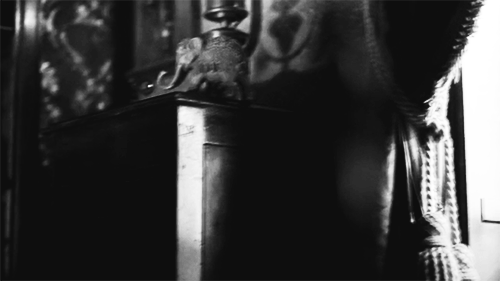
-----------------------------------
I cannot live without brainwork. What else is there to live for? Stand at the window there. Was there ever such a dreary, dismal, unprofitable world? See how the yellow fog swirls down the street and drifts across the dun-coloured houses. What could be more hopelessly prosaic and material? What is the use of having powers, Doctor, when one has no field upon which to exert them?

- ancientsgate
- Reichenbach Survivor
 Offline
Offline 
- From: New Hampshire, USA
- Registered: June 8, 2012
- Posts: 5,532
Re: The Abominable Bride (for those who have seen it)
I confess that Mary being in last night's episode was really the # 1 thing I didn't like about it. I wouldn't care if I never saw her again. Are we supposed to like her or not? Are we supposed to think she's bad for John or not?
I haven't watched the last season for ages. Wasn't Mary pregnant? Was she pregnant in last night's ep? If she was, I wasn't aware of it. I AM SO CONFUSED. Where is the baby?
And one last thought-- it hasn't escaped me that in "reality" John and Mary are married, and she's supposed to "take him home," while touchy-feely Johnlock moments and the question about why don't they just elope? That was all in Sherlock's mind palace. How interesting. Are we to glean that Sherlock is conflicted about his relationship with John, all the while admitting that personal relationships are not his thing anyway, and that John is thoroughly taken? Are the writers sending the johnlockers some kind of message? If so, they're being too obtuse about it for me, 'cause I do not get it.
Last edited by ancientsgate (January 2, 2016 5:52 pm)
- ancientsgate
- Reichenbach Survivor
 Offline
Offline 
- From: New Hampshire, USA
- Registered: June 8, 2012
- Posts: 5,532
Re: The Abominable Bride (for those who have seen it)
Sherlock Holmes wrote:
..........But what about the baby?
Thank you. that was what I was just asking. ??? Could it be that the writers didn't know what to do with the baby or how to incorporate him or even the idea of him into the show, so they kind of winked and left him out?
- tonnaree
- The "B" is SILENT! (Mod)
 Offline
Offline 
- From: Atlanta, Georgia, USA
- Registered: May 31, 2013
- Posts: 9,270
Re: The Abominable Bride (for those who have seen it)
nakahara wrote:
Some people noticed that the elephant in the room was broken during the Moriarty scene. Interesting.
F*** that elephant. I never liked him. ![]()
----------------------------------------------------------------------
Proud President and Founder of the OSAJ.
Honorary German
"Anyone who takes himself too seriously always runs the risk of looking ridiculous; anyone who can consistently laugh at himself does not".
-Vaclav Havel
"Life is full of wonder, Love is never wrong." Melissa Ethridge
I ship it harder than Mrs. Hudson.


- ancientsgate
- Reichenbach Survivor
 Offline
Offline 
- From: New Hampshire, USA
- Registered: June 8, 2012
- Posts: 5,532
Re: The Abominable Bride (for those who have seen it)
James Norrington wrote:
My dad (who hasn't watched any Sherlock, as far as I know) asked me today how the episode was and I had a hard time giving an answer because... I'm still blown away. And my heart is broken. And I'm confused. And I LOVED IT! But still, I'm somewhat incredibly sad when I think about the episode and do not exactly know why.
So how can you describe that to somebody who doesn't know about Sherlock or the state it can put you in? It's impossible. So I just said it was fantastic, which doesn't sum it up properly, but I just had to say something. :D
The drug thing is really sad. I cannot fathom for a moment why they felt they had to go in that direction with Sherlock. It's original canon that he had a cocaine habit, and even in OUR Sherlock series, he has that background. But except for the episode where they showed him going to a shooting gallery and imbibing in order to get info on a case, as far as i can remember, Sherlock has been sober and proud of it. And now this. Which is sad.
As for how to explain it to someone who's never seen it, well, you can't. It was written FOR Sherlock fans, and no one but us could begin to understand it. And even we don't understand it, because the writers were deliberately being too clever for the room, as usual.

